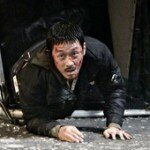After the fatal shooting of two North Korean guards by a South Korean soldier at the Demilitarized Border between the two adversarial nations, an independent body of Swiss and Swedish officials are sent in to investigate the crime and contain the potentially explosive political situation. So begins Park Chan-wook’s Joint Security Area [Gongdong gyeongbi guyeok JSA], a 2000 film that combines an intricately assembled mystery with absorbing human drama. Artfully framed and beautifully shot, the film is driven by several fantastic performances by actors working from a tautly constructed non-linear script. Gripping on both an intellectual and an emotional level in spite of its occasionally lethargic pace, Joint Security Area is an outstanding anti-conflict film with a powerful reconciliatory message that also doubles as a top notch brainteaser in which every element slides perfectly into place.
As a mystery, Joint Security Area recalls the likes of Bryan Singer’s The Usual Suspects and Akira Kurosawa’s Rashomon, jumping backwards and forwards through time and in and out of imagined situations. Major Sophie Jang (Lee Young Ae, Sympathy for Lady Vengeance) from the Neutral Nations Supervisory Committee heads the investigation; the Southern Korean Generals claim the shooting came about during a daring escape by a kidnapped Southern soldier, while their Northern counterparts maintain it was in fact a brutal and callous assassination plot. Meanwhile, the men who were actually involved in the incident – the accused Southern sergeant Lee Soo-hyeok (Lee Byung-hun, The Good, The Bad and the Weird) and the one survivor of his alleged attack, Northern sergeant Oh Kyeong-pil (Song Kang-ho, The Host) remain oddly silent, sticking to their signed statement under the hawk-like gaze of their superiors. But as Major Jang digs deeper into the mystery, she discovers that the answers behind the shooting are far more personal and complex than a simple dispute over national borders.
Director Park Chan-wook is one of the most prominent South Korean filmmaker working today, most familiar to Western audiences for his so-called Vengeance Trilogy (consisting of the three thematically linked films: Sympathy for Mr. Vengeance in 2002, Oldboy in 2003 and Sympathy for Lady Vengeance in 2005). In an earlier work like JSA, many of Chan-wook’s recognisable attributes are already visibly emerging; these include his careful framing, deliberate pacing and unusual combination of humour and significant violence. The script is also filled with simple but memorable recurring elements; for example, characters mention seeing landmines exploding like fireworks, then in flashback an hour later Chan Wook lets us witness this haunting image for ourselves.
![Joint Security Area [2000] (KOFFIA Review) 600full j.s.a. joint security area screenshot Joint Security Area [2000] (KOFFIA Review)](/wp-content/uploads/600full-j.s.a.-joint-security-area-screenshot.jpg)
But although there are certainly similarities between JSA and Chan-wook’s later works, those who go in expecting the overt stylishness of Oldboy or Thirst may find themselves surprised by the more nuanced character drama that dominates the second and third acts of this film. In the months leading up to the shoot, we eventually discover that Sergeants Lee and Oh, as well as the deceased Northern Private Jeong Woo-jin (Shin Ha-kyun, Sympathy for Mr. Vengeance) and skittish Southern Private Nam Sung-shik (Kim Tae Woo, No Doubt), formed a close friendship in secret that transcended their nation’s respective ideologies. In this way, Chan Wook makes clear the pointlessness of the conflict between these two nations whose citizens do not really understand or care about the lofty, vague political ideals that divide them. The performances from the four actors are all excellent, as the low level soldiers meet in the dead of night to share stories, jokes and consider a future where their countries might one day be reunited. The scenes have a simple but powerful quality to them – a sense of brotherhood that makes the shooting all the more tragic, and the questions as to why it occurred all the more compelling.
JSA deservedly remains one of the most celebrated and successful motion pictures in the history of South Korean cinema; that Quentin Tarantino recently named it one of his top twenty movies since he became a filmmaker provides Western audiences with yet another reason to track the film down. A near perfect mix of enigma and drama, Joint Security Area is an exceptional, emotionally resonant filmic puzzle that also marked the beginning of a decade of incredible films by one of the world’s most talented auteurs.
—
Joint Security Area screened as part of KOFFIA – The Korean Film Festival in Australia. KOFFIA runs in Melbourne from September 10th-13th. For more information, click here.
You can read all of our coverage of KOFFIA 2011 here.
 Follow the author Tom Clift on Twitter.
Follow the author Tom Clift on Twitter.

![Joint Security Area [2000] (KOFFIA Review)](/wp-content/uploads/joint-security-area_06p-700x374.jpg)



 Our picks of the 2012 Rotterdam International Film Festival (IFFR)
Our picks of the 2012 Rotterdam International Film Festival (IFFR)

![The Recipe [2010] (BAFF Review) The Recipe [2010] (BAFF Review)](/wp-content/uploads/photo1354581-150x150.jpg)








